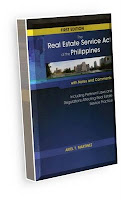TOP OF MIND
By Glenn Raymond O. Paradela (The Philippine Star) | Updated June 18, 2013 -
The Bureau of
Internal Revenue (BIR) has issued Revenue Regulations No. 6-2013 (RR 6-2013),
amending certain provisions of Revenue Regulations No. 6-2008 (RR 6-2008)
entitled “Consolidated Regulations Prescribing the Rules on the Taxation of
Sale, Barter, Exchange or Other Disposition of Shares of Stock Held as Capital
Assets.”
Specifically,
the new regulation, published last April 22, 2013, amended the definition of
fair market value (FMV) of the shares of stock being sold where the shares are
not traded through a local stock exchange.
The definition is critical in view of the possible imposition of the
donor’s tax on top of the capital gains tax (CGT). Under the Tax Code, in case of sale of shares
of stock not traded in the local stock exchange, the net capital gains will be
subject to a CGT of five percent on the first P100,000 and 10 percent on the
amounts in excess of P100,000. However,
in the event the selling price is less than the FMV of the shares of stock, the
seller is deemed to have received a gift.
The excess of the FMV over the selling price will be considered as
taxable gift subject to donor’s tax.
Hence, it is common for taxpayers selling shares of stock not traded
through the local stock exchange to use the FMV as the selling price to avoid
the donor’s tax.
However, with
RR 6-2013, the question now is how to determine FMV. Under the old regulations (RR 6-2008), the
FMV of shares of stock not traded in the local stock exchange would be the book
value of the shares as shown in the audited financial statements (AFS) nearest
to the date of sale. On the other hand,
according to RR 6-2013, the value of the shares of stock at the time of the
sale would be the FMV. In determining
the value of the shares, RR 6-2013 prescribes a valuation procedure that
changes the stated values of a company’s assets and liabilities to reflect its
current fair market values. RR 6-2013
states that the Adjusted Net Asset should be used whereby all assets and
liabilities are adjusted to FMV. The
difference between the total FMV of the adjusted assets and the total FMV of
the adjusted liabilities is the indicative value of the equity (what the
business is considered to be worth).
In the event the
assets of the corporation consist of real property, the appraised value at the
time of sale should be the higher of – FMV as determined by the commissioner of
Internal Revenue, or FMV as shown in the schedule of values fixed by the
provincial and city assessors, or FMV as determined by an independent
appraiser.
With the new
definition of FMV in place, it is expected that higher taxes would be collected
on the sale of shares of stock not traded in the local stock exchange.
But this
situation is not that simple because the determination of FMV under RR 6-2013
raises a lot of questions with respect to sufficiency and timing of documents
to establish FMV. When a taxpayer sells
shares of stock not traded in the local stock exchange, he needs to get a
Certificate Authorizing Registration (CAR) from the proper BIR office. The CAR
is required to have the sale recorded in the company’s Stock and Transfer Book.
To get the
CAR, the taxpayer would have to submit to the BIR documentary requirements such
as the Deed of Absolute Sale, latest AFS, and the CGT and Documentary Stamp Tax
Returns. Based on RR 6-2013, it appears that he would also need to present the
Tax Declaration, Zonal Valuation and independent appraiser’s report covering
the real property owned by the company to establish FMV. In this respect, in the absence of the
independent appraiser’s report, would the Tax Declaration and the Zonal
Valuation of the real property be sufficient to establish FMV? If the
independent appraiser’s report is a requirement, who would shoulder the costs
which are most likely not cheap? It
could be that this requirement imposes additional burden to the selling
stockholder to pay for the report. With
respect to personal property, RR 6-2013is not clear if the AFS of the company
is sufficient to establish its FMV.
As to the
timing of the document, would the documents needed to establish the FMV be as
of the time of sale?
What could
add to the confusion is that there seems to be a view within the BIR that the
valuation under RR 6-2013 applies only to certain properties.
To answer
these questions, the BIR may have to issue clarifications; otherwise, RR 6-2013
may impede sales transactions that could impact on the financial viability of
the company. When fresh capital is
required by the company, and the solution is for an existing shareholder to
sell to a new investor, a problem could arise if the BIR cannot agree on the
valuation of the company’s shares in view of the valuation issues caused by the
implementation of RR 6-2013. One could
say then that redefining matters is creating gray areas.
Glenn Raymond
O. Paradela is a supervisor from the tax group of Manabat Sanagustin & Co.
(MS&Co.), the Philippine member firm of KPMG International.
This article
is for general information purposes only and should not be considered as
professional advice to a specific issue or entity.
The view and
opinions expressed herein are those of the author and do not necessarily
represent the views and opinions of KPMG International or MS&Co. For
comments or inquiries, please email manila@kpmg.com or rgmanabat@kpmg.com
_______________________________________________________________






